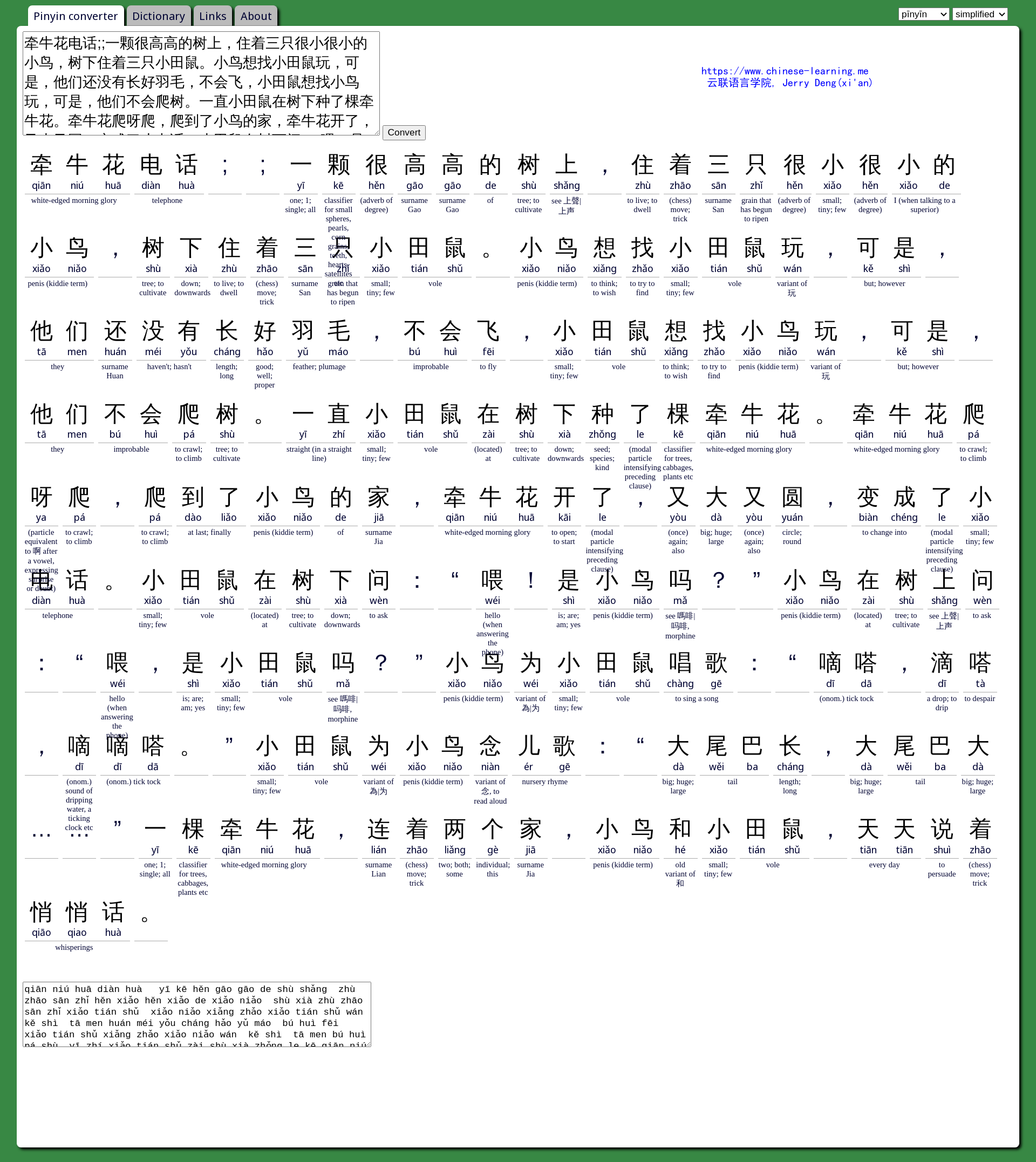
Show Pīnyīn
一颗很高高的树上,住着三只很小很小的小鸟,树下住着三只小田鼠。
小鸟想找小田鼠玩,可是,他们还没有长好羽毛,不会飞,小田鼠想找小鸟玩,可是,他们不会爬树。
一直小田鼠在树下种了棵牵牛花。
牵牛花爬呀爬,爬到了小鸟的家,牵牛花开了,又大又圆,变成了小电话。
小田鼠在树下问:“喂!是小鸟吗?”小鸟在树上问:“喂,是小田鼠吗?”
小鸟为小田鼠唱歌:“嘀嗒,滴嗒,嘀嘀嗒。”小田鼠为小鸟念儿歌:“大尾巴长,大尾巴大……”
一棵牵牛花,连着两个家,小鸟和小田鼠,天天说着悄悄话。
yīkē hěn gāogāode shùshàng , zhù zhe sānzhǐ hěnxiǎo hěnxiǎo de xiǎoniǎo , shùxià zhù zhe sānzhǐ xiǎo tiánshǔ 。
xiǎoniǎo xiǎng zhǎo xiǎo tiánshǔ wán , kěshì , tāmen huán méiyǒu chánghǎo yǔmáo , bùhuì fēi , xiǎo tiánshǔ xiǎng zhǎo xiǎoniǎo wán , kěshì , tāmen bùhuì páshù 。
yīzhí xiǎo tiánshǔ zài shùxiàzhǒng le kē qiānniúhuā 。
qiānniúhuā pá ya pá , pá dào le xiǎoniǎo de jiā , qiānniúhuā kāi le , yòu dàyòuyuán , biànchéng le xiǎo diànhuà 。
xiǎo tiánshǔ zài shùxià wèn : “ wèi ! shì xiǎoniǎo ma ? ” xiǎoniǎo zài shùshàng wèn : “ wèi , shì xiǎo tiánshǔ ma ? ”
xiǎoniǎo wéi xiǎo tiánshǔ chànggē : “ dīdā , dī dā , dī dīdā 。 ” xiǎo tiánshǔ wéi xiǎoniǎo niàn érgē : “ dà wěiba cháng , dà wěiba dà ”
yīkē qiānniúhuā , lián zhe liǎnggè jiā , xiǎoniǎo hé xiǎo tiánshǔ , tiāntiān shuō zhe qiāoqiaohuà 。

On a very tall tree lived three very small birds, and under the tree lived three little voles.
The little bird wants to play with the little voles, but they haven't grown their feathers yet, and they can't fly. The little voles want to play with the little birds, but they can't climb trees.
The little field mouse planted a morning glory under the tree.
The morning glory climbed and climbed, and climbed to the bird's house. The morning glory bloomed, big and round, and turned into a small phone.
The little field mouse asked under the tree: "Hey! Is it a bird?" The little bird asked on the tree: "Hi, is that a little field mouse?"
The little bird sang to the little field mouse: "Tick, tick, tick." The little field mouse sang a nursery rhyme to the little bird: "The big tail is long, the big tail is big..."
A morning glory is connected to two families, the little bird and the little field mouse, whispering to each other every day. .
En un árbol muy alto vivían tres pájaros muy pequeños, y debajo del árbol vivían tres campañoles pequeños.
El pajarito quiere jugar con los campañoles, pero todavía no les han crecido las plumas y no pueden volar Los pajaritos quieren jugar con los pajaritos, pero no pueden trepar a los árboles.
El ratoncito de campo plantó una campanilla debajo del árbol.
La gloria de la mañana subió y subió, y subió a la casa del pájaro La gloria de la mañana floreció, grande y redonda, y se convirtió en un pequeño teléfono.
El ratoncito de campo preguntó debajo del árbol: "¡Oye! ¿Es un pájaro?" El pajarito preguntó en el árbol: "Hola, ¿eso es un ratoncito de campo?"
El pajarito le cantó al ratoncito de campo: "Tic, tic, tic". El ratoncito de campo le cantó una canción de cuna al pajarito: "La cola grande es larga, la cola grande es grande..."
Una gloria de la mañana está conectada a dos familias, el pajarito y el ratoncito de campo, susurrándose entre sí todos los días. .
Sur un très grand arbre vivaient trois très petits oiseaux, et sous l'arbre vivaient trois petits campagnols.
Le petit oiseau veut jouer avec les petits campagnols, mais ils n'ont pas encore poussé leurs plumes, et ils ne peuvent pas voler.Les petits campagnols veulent jouer avec les petits oiseaux, mais ils ne peuvent pas grimper aux arbres.
La petite souris des champs a planté une gloire du matin sous l'arbre.
La gloire du matin a grimpé et grimpé, et a grimpé jusqu'à la maison de l'oiseau.La gloire du matin a fleuri, grande et ronde, et s'est transformée en un petit téléphone.
Le petit mulot a demandé sous l'arbre : "Hé ! C'est un oiseau ?" Le petit oiseau a demandé sur l'arbre : "Salut, c'est un petit mulot ?"
Le petit oiseau a chanté au petit mulot : « Tic, tic, tic. » Le petit mulot a chanté une comptine au petit oiseau : « La grande queue est longue, la grande queue est grosse… »
Une gloire du matin est liée à deux familles, le petit oiseau et la petite souris des champs, qui se chuchotent tous les jours. .
とても高い木の上に3羽のとても小さな鳥が住んでいて、その木の下に3匹の小さなハタネズミが住んでいました。
小鳥はハタネズミと遊びたがるが、まだ羽が生えていないので飛べない ハタネズミは小鳥と遊びたいが、木に登ることができない。
小さな野ネズミは、木の下にアサガオを植えました。
朝顔が登って登って鳥の家に登ると、朝顔が大きくて丸く咲き、小さな電話になりました。
小さな野ネズミは木の下でたずねました:「ねえ! 鳥ですか?」 木の上で小鳥がたずねました:「やあ, これは小さな野ネズミですか?」
小鳥は小さな野ネズミに歌いました:「カチカチ、カチカチ、カチカチ」小さな野ネズミは小鳥に童謡を歌いました:「大きな尾は長い、大きな尾は大きい...」
アサガオは、毎日ささやき合う小鳥と野ネズミの2つの家族とつながっています。 .
Auf einem sehr hohen Baum lebten drei sehr kleine Vögel, und unter dem Baum lebten drei kleine Wühlmäuse.
Der kleine Vogel will mit den kleinen Wühlmäusen spielen, aber ihnen sind die Federn noch nicht gewachsen und sie können nicht fliegen Die kleinen Wühlmäuse wollen mit den kleinen Vögeln spielen, aber sie können nicht auf Bäume klettern.
Die kleine Feldmaus pflanzte eine Winde unter den Baum.
Die Prunkwinde kletterte und kletterte und kletterte zum Haus des Vogels Die Prunkwinde blühte, groß und rund, und verwandelte sich in ein kleines Telefon.
Die kleine Feldmaus fragte unter dem Baum: „Hey, ist das ein Vogel?“ Der kleine Vogel fragte auf dem Baum: „Hallo, ist das eine kleine Feldmaus?“
Der kleine Vogel sang der kleinen Feldmaus: "Tick, tick, tick." Die kleine Feldmaus sang dem kleinen Vogel ein Kinderlied vor: "Der große Schwanz ist lang, der große Schwanz ist groß..."
Eine Winde ist mit zwei Familien verbunden, dem kleinen Vogel und der kleinen Feldmaus, die jeden Tag miteinander flüstern. .